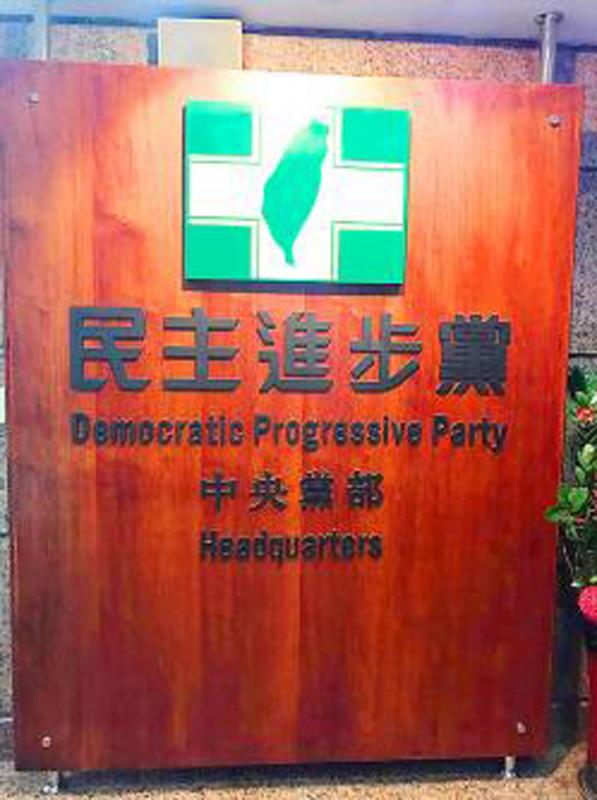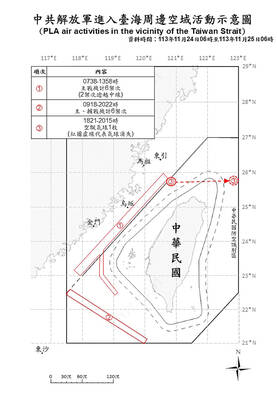The Democratic Progressive Party (DPP) is drafting anti-corruption rules in the wake of DPP Legislator Su Chen-ching’s (蘇震清) alleged involvement in a bribery case.
The Taipei District Prosecutors’ Office on Saturday filed a motion with the Taipei District Court to detain Su — along with Chinese Nationalist Party (KMT) legislators Chen Chao-ming (陳超明) and Sufin Siluko (廖國棟), New Power Party chairman Hsu Yung-ming (徐永明), and independent Legislator Chao Cheng-yu (趙正宇) — over their alleged involvement in a department store bribery case.
Chao was released late on Sunday night on NT$1 million (US$33,863) bail, while the others were waiting for the court’s decision as of press time last night.

Photo: Su Fun-her, Taipei Times
The DPP’s anti-corruption rules are to be divided into two parts.
The first would contain principles regarding “staff recruitment, procurement and the revolving door policy” for DPP political workers and managers at state-run corporations, party sources said.
The second part would involve ethical requirements for DPP political workers, including avoiding attending meals or events or engaging in financial transactions inconsistent with the images of independence, neutrality, integrity and honesty, the sources said.
DPP workers would also be prohibited from abusing the power of their positions for illicit gains, including receiving inappropriate gifts or other benefits from stakeholders in their businesses, they said.
The draft rules, which have been discussed multiple times by party committees, are expected to be finalized by the DPP caucus on Tuesday next week, before being sent to the DPP Central Standing Committee for final approval, they added.
In related news, the Control Yuan’s latest report on property declarations by public servants showed that the value of properties declared by Su grew more than 11 times from NT$6.8 million five years ago to more than NT$75 million last year.
The 159th report on property declaration by public servants published on April 17 showed that Su, who represents Pingtung County’s first electoral district, and his wife, Liao Ching-ju (廖靖汝), owned eight plots of land: three each in Taitung and Pingtung counties and two in Pingtung City.
They owned four buildings, all in Pingtung City, the issue showed.
Su and his wife had NT$75.28 million in savings, as well as five entries of debt that totaled more than NT$200 million, it showed.
The largest debt was listed under Su’s name, recorded about two years ago under the title of “working fund.”
The other entries were also titled “working funds” in addition to a house mortgage valued at NT$20 million, the report showed.
The report showed that Chen had 44 plots of land in Miaoli County and NT$1.3 million in savings, NT$100,000 in securities and NT$16.37 million in debt.
Sufin Siluko had multiple plots of land and buildings, as well as NT$2.96 million in savings, NT$43,280 in securities and NT$40.32 million in debt, they showed.
Chao had multiple plots of land and buildings, as well as NT$23.29 million in savings, while Hsu had NT$5.23 million in savings and a mortgage of NT$15 million, the records showed.

A decision to describe a Chinese Ministry of Foreign Affairs statement on Singapore’s Taiwan policy as “erroneous” was made because the city-state has its own “one China policy” and has not followed Beijing’s “one China principle,” Deputy Minister of Foreign Affairs Tien Chung-kwang (田中光) said yesterday. It has been a longstanding practice for the People’s Republic of China (PRC) to speak on other countries’ behalf concerning Taiwan, Tien said. The latest example was a statement issued by the PRC after a meeting between Singaporean Prime Minister Lawrence Wong (黃循財) and Chinese President Xi Jinping (習近平) on the sidelines of the APEC summit

Taiwan’s passport ranked 34th in the world, with access to 141 visa-free destinations, according to the latest update to the Henley Passport Index released today. The index put together by Henley & Partners ranks 199 passports globally based on the number of destinations holders can access without a visa out of 227, and is updated monthly. The 141 visa-free destinations for Taiwanese passport holders are a slight decrease from last year, when holders had access to 145 destinations. Botswana and Columbia are among the countries that have recently ended visa-free status for Taiwanese after “bowing to pressure from the Chinese government,” the Ministry

HEALTHCARE: Following a 2022 Constitutional Court ruling, Taiwanese traveling overseas for six months would no longer be able to suspend their insurance Measures allowing people to suspend National Health Insurance (NHI) services if they plan to leave the country for six months would be abolished starting Dec. 23, NHIA Director-General Shih Chung-liang (石崇良) said yesterday. The decision followed the Constitutional Court’s ruling in 2022 that the regulation was unconstitutional and that it would invalidate the regulation automatically unless the NHIA amended it to conform with the Constitution. The agency would amend the regulations to remove the articles and sections that allow the suspension of NHI services, and also introduce provisional clauses for those who suspended their NHI services before Dec. 23, Shih said. According to

‘GRAY ZONE’ TACTICS: China continues to build up its military capacity while regularly deploying jets and warships around Taiwan, with the latest balloon spotted on Sunday The US is drawing up contingency plans for military deployments in Japan and the Philippines in case of a Taiwan emergency, Japan’s Kyodo news agency reported. They would be incorporated in a first joint operation plan to be formulated in December, Kyodo reported late on Sunday, citing sources familiar with Japan-US relations. A US Marine Corps regiment that possesses High Mobility Artillery Rocket Systems — a light multiple rocket launcher — would be deployed along the Nansei Island chain stretching from Kyushu to Yonaguni near Taiwan, Kyodo said. According to US military guidelines for dispatching marines in small formations to several locations,